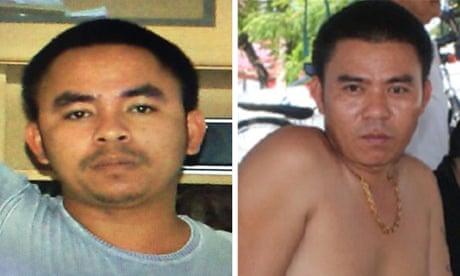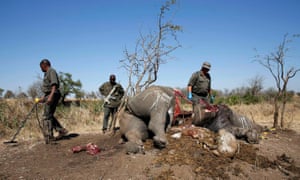Extract from The Guardian
Exclusive: Investigation
uncovers the ringleaders profiting from $23bn annual trade in illicit
animals after more than a decade of undercover surveillance
- Help fund our journalism by becoming a Guardian supporter.
A
ranger looks on after performing a post-mortem on a rhino killed for
its horn in South Africa’s Kruger national park. Photograph:
Siphiwe Sibeko/Reuters
Oliver
Holmes in Bangkok and Nick
Davies
Monday
26 September 2016 22.14 AEST
A
major investigation into global wildlife crime today names for the
first time key traffickers and links their illegal trade to corrupt
officials at the highest levels of one Asian country.
The
investigation, published by the Guardian, exposes the central role of
international organised crime groups in mutilating and killing tens
of thousands of animals and threatening to eliminate endangered
species including tigers, elephants and rhinos.
The
in-depth reporting identifies suspected traders across several
continents, from South
Africa to Thailand and in the markets of China, where animal
parts are used in traditional medicines.
For
the past year, the Guardian has worked with independent investigators
at Freeland, an anti-trafficking organisation that has been providing
information and analytical support to a Thai government surveillance
team.
In
the absence of effective international attempts to block the
business, Freeland has agreed to give exclusive access to
intelligence it has accumulated over 14 years that identifies primary
traffickers.

The crime family at the centre of Asia's animal trafficking network
It
points to two Vietnamese siblings, the Bach brothers, as key suspects
who control a primary smuggling route for endangered animals.
Separately,
the Guardian will on Tuesday report on evidence it has that suggests
the industry has political support across several countries, and that
one state even collects a 2% cut from the gross value of illegal
wildlife imports.
The
series is published during a crucial conference in Johannesburg,
which opened on Saturday. The 182 nations who have signed the
Convention on International Trade in Endangered Species (Cites) are
debating the future of animals that are being wiped out by a criminal
industry.
The
global body is tasked with regulating international wildlife trade,
but has no enforcement powers, meaning the slaughter of endangered
species and their sale for profit continues unabated.
Worth
$23bn (£17.5bn) a year, animal trafficking is the fourth most
lucrative black market industry after drugs, people and arms
smuggling. But in contrast to those industries, international law
enforcement has proven inadequate.
Many
iconic animals are heading toward extinction: only 30,000 rhinos are
alive today, 5% of the number four decades ago. About 1,000 are
killed by poachers annually – and that figure has risen each year
in the last six.
Elephants
are being killed in even greater numbers: 20,000 for their tusks last
year alone. Tigers, currently numbering 3,500 in the wild, are also
in imminent danger.
But
smaller animals, too, are facing extinction. Scaly anteaters, called
pangolins, are shipped live in fishnet bags across borders for their
scales, which are believed by some to help mothers breastfeed.
Several vulnerable sub-species of turtles, pythons, antelopes and
birds are also in sharp decline.
Freeland’s
findings, together with police documents and interviews as well as
surveillance footage and bank transfer statements, show the Bach
brothers have dramatically scaled up their operations in smuggling
these animals during the past three years.

Vixay
Keosavang.
Until
today, international attention had been focused almost solely on a
Lao man called Vixay Keosavang, who was assumed to be the kingpin of
the trade and known as the Pablo Escobar of wildlife trafficking.
But
this week’s investigation reveals how Keosavang appears to have
removed himself from the trade in 2014 after the US government put up
a $1m reward to end his operations, the only monetary reward ever
offered for a wildlife trader.
Meanwhile,
the role of the Bach brothers has, until now, remained unexposed. And
while running their operations from a discreet Thai town on the
border with Laos,
they are gathering huge profits from the deadly trade.
Well-known
locally for their criminal activities, which also include vehicle
smuggling, the Bachs run legitimate businesses in wholesale
agriculture and forest products, construction materials, electrical
equipment, hotels, and food services.
The
siblings base their operations in Nakhon Phanom, a rural region on
the Thai side of the Mekong river that marks the border with Laos.
They own multiple properties, including warehouses, apartment
buildings, and a fleet of expensive vehicles. Their suspected
headquarters is built like a fort, covered almost entirely in a cage
of metal bars.
Their
cars, which have their licence plates routinely changed, are moved
across the border. One vehicle was filmed with a bespoke deep-set
trunk that investigators believe provides hidden storage.
- Producing in-depth, thoughtful, well-reported journalism is difficult and expensive - but supporting us isn’t. If you value the the Guardian’s coverage of wildlife trafficking, please help to fund our journalism by becoming a supporter.

No comments:
Post a Comment